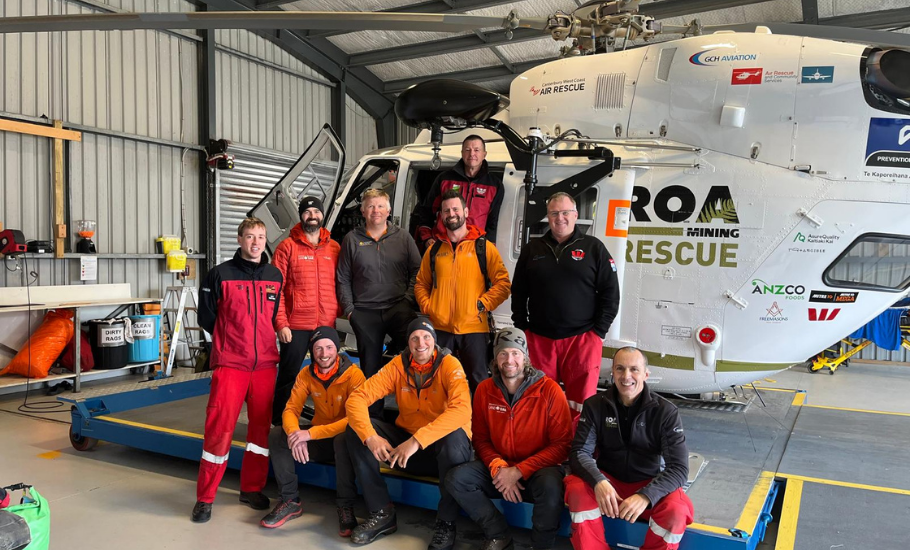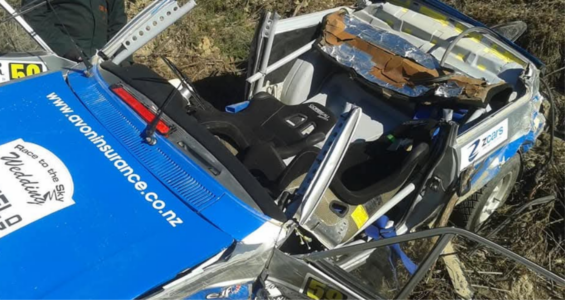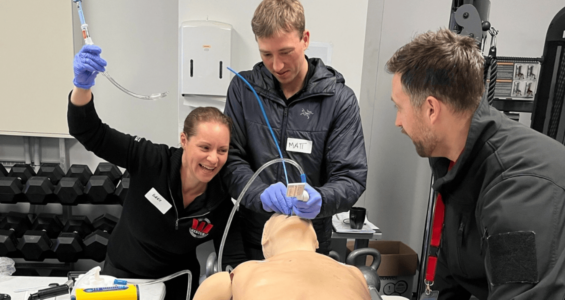The ROA Mining Rescue Helicopter crew and LandSAR’s specialist Alpine Cliff Rescue team have joined forces to upskill local volunteers for helicopter rescue missions.
“We saw an opportunity to upskill the local Alpine Cliff Rescue team so we could better utilise their skillset,” says Aaron Wafer, Deputy Operations Manager for the rescue helicopter service.
The winch training exercise involved the ROA Mining Rescue Helicopter crew training six members of the Alpine Cliff Rescue team to be able to go down the wire on winch operations. The idea for the training was sparked by a mission earlier this year to a remote valley in Franz Josef, in which 12 hours was spent rescuing a woman with a badly injured leg.
Aaron says the rescue helicopter winched a paramedic into the remote area, who then trekked to the patient.
“Due to the terrain, the patient had to be moved to a safe place where they could be winched out. This is when we called the Alpine Cliff Rescue team for help.”
Because the Alpine Cliff Rescue team were not trained on helicopter or winch operations, they had to trek to the site.
Alpine Cliff Rescue Team Leader Marius Bron says it was a twelve-hour mission.
“We arrived at the scene at 11 pm. It then took us three hours to carry the stretcher across very technical terrain to reach a spot where it was safe for the rescue helicopter to winch the patient out. We then had to walk all the way out – but at least it gave us a good chance to debrief the job with the team!” Marius says.
Marius says the combination of skill sets between Alpine Cliff Rescue and rescue helicopter crews works really well together and they’re looking forward to future training opportunities.
The crews are hoping to train together every six months, with each training focusing on different terrains or challenges.
“We’re planning our next combined training at the glaciers and we’re hopeful the community will help us make that happen,” Aaron says.
The winch training exercise came at a cost of $13,500 and was funded by the Canterbury West Coast Air Rescue Trust thanks to support from the Greymouth Masonic Lodge Charitable Trust.
“We gave our time freely for this training and really enjoyed the opportunity to upskill the local volunteers, but operating helicopters comes at a cost,” Aaron says.
He’s hoping local businesses, organisations or individuals may wish to partner with the Canterbury West Coast Air Rescue Trust to support the future training exercises.
“The Alpine Cliff Rescue team have a tremendous ability to traverse technical terrain and an in-depth knowledge of the local area, while our crew have the transport and the critical care capabilities.
“Being able to have the Alpine Cliff Rescue team join us on the rescue helicopter and winch into tough situations will be an enormous benefit to rescue operations West Coast wide,” Aaron says.
Marius says this kind of specialist training is important to his team.
“It keeps our team sharp, confident, and ready to respond when people need us most. Being able to practice these skills in a safe, realistic environment makes all the difference when we’re out there doing the real thing.”
Marius says they are incredibly grateful to the Canterbury West Coast Air Rescue Trust for making this training exercise possible.
“Having the community support us means more to us than just funding; it gives us peace of mind knowing the community stands behind the work we do.”
The West Coast will soon be having a major upgrade to its rescue helicopter service, with a H145 helicopter due to replace the current BK117 model operating on the West Coast.
The Canterbury West Coast Air Rescue Trust has recently purchased four H145 helicopters, a move which will transform the region’s rescue helicopter service. Having a fleet of H145 helicopters will support the roll out of Instrument Flight Rules (IFR), which will enable the rescue helicopters to fly in more adverse weather conditions.
Trust CEO Christine Prince says having a modernised rescue helicopter fleet with IFR capability will enable the service to save more lives, more often.
“We are investing now more than ever in the future of our helicopter service. Funding specialist training, such as this winch training, is a significant part of that investment. We need our community’s support now more than ever to provide the world-class rescue helicopter service our communities deserve,” Christine says.







